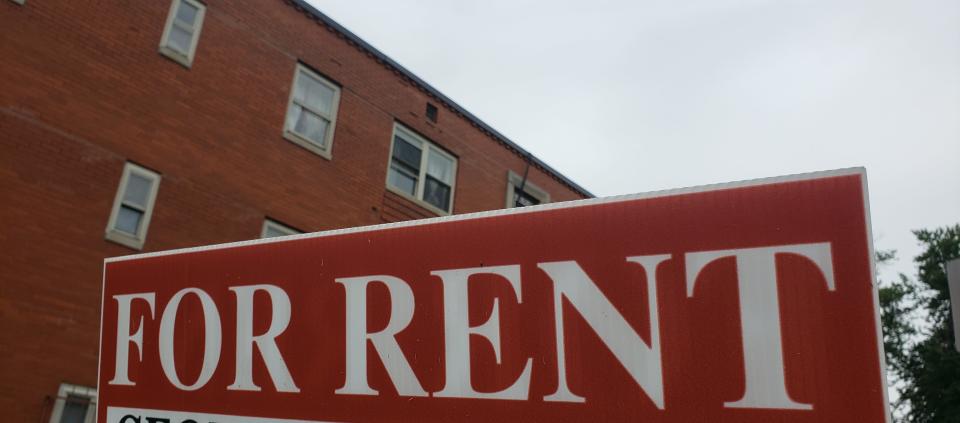SafeNet chief applauds domestic violence protections in Erie eviction ordinance
Robyn Young has a unique vantage point when it comes to the proposed new eviction law that received final approval from Erie City Council on Wednesday night.
Young is the executive director of SafeNet, 1702 French St., which offers a variety of programs and assistance for local victims of domestic violence.

City Council voted 6-0 Wednesday to approve the new law, which further defines the legal grounds for eviction for landlords and renters in Erie — including the court-ordered removal of a tenant — and provide other protections for renters, including victims of domestic violence.
Councilman Mel Witherspoon was absent.
Previous coverage: Erie City Council gives preliminary OK to new landlord-tenant ordinance
Young, though, is also a landlord who owns rental properties in the city of Erie. She supports the new landlord-tenant law, proposed by City Council members Susannah Faulkner and Jasmine Flores.
Young said specific provisions in the proposed ordinance, aimed at protecting victims of domestic violence, are a good idea.
SafeNet assists roughly 2,000 local domestic violence victims each year.
“To me, this makes sense from both perspectives,” Young said. "We have helped individuals in a domestic violence situation find new places to live. We have advocated on behalf of individuals with their landlords, trying to get locks changed and those types of things."
"It's important for everyone to be safe and to feel safe," Young said. "It's good to have laws like this as an (additional) measure of protection."
Erie now becomes the third city in the state to enact such a law, following Philadelphia and State College.
Domestic violence protections
For example, the Erie ordinance stipulates that at the request of a tenant who is a survivor of domestic violence, landlords must permit that tenant to terminate a lease regardless of lease term and without early termination penalty.
The tenant must give at least 30 days written notice; vacate the property no later than the early termination date; and provide court-approved paperwork regarding domestic violence, such as a Protection From Abuse order.
In such circumstances, the tenant agrees to pay the landlord an amount equal to two times the monthly rent to terminate the lease early.
Further, if a tenant who is a survivor of domestic violence requests new locks at the rental unit, the landlord will have those locks changed at the tenant’s cost.
Landlords can also enter into a new lease/modify a lease with a domestic violence survivor if the tenant wants to stay and someone who had been living in the same unit is evicted for being an abuser.
Such provisions are common components of what are widely known as "just cause" or "good cause" eviction laws nationwide. The laws seek to further specify, beyond existing state/local laws, what can lead to eviction and give tenants the right to renew their leases.

Faulkner has said she proposed the ordinance to provide further clarity for renters, as well as additional layers of protection regarding eviction. Pennsylvania’s Landlord/Tenant Act states core reasons for eviction and requires a landlord to give tenants written eviction notice for both nonpayment of rent or any breach of the lease/end of the lease term.

Young also pointed out that the Erie ordinance complements protections already in place via the federal Violence Against Women Act, signed by then-President Bill Clinton in September 1994 to comprehensively address domestic violence, sexual assault, dating violence and stalking.
The federal law, for example, prohibits landlords from evicting/refusing to rent to an applicant because he or she is a domestic violence victim, and stipulates that criminal acts related to domestic violence cannot be a reason for eviction regarding a domestic violence victim.
"You want to protect victims," Young said. "And as a landlord, you don't want someone being abused on your property and you don't want other tenants' lives being interrupted by abusive behavior."
Ordinance breakdown
The Erie ordinance also addresses:
Tenant’s rights in the event of code violations. The new ordinance makes it unlawful for any landlord to terminate a lease with an existing tenant because of code violations at the property, unless the tenant has violated specific provisions of the lease agreement. Further, the ordinance prohibits landlords from amending/modifying a lease “where the change is intended to recover the cost or value of corrections necessary to bring the property into compliance” with city code enforcement rules.
There is one exception, according to the ordinance: “this Section shall not apply to any Landlord who desires to terminate an existing lease after a Notice of Violation has been issued in order that the Premises may be rehabilitated and the violation cured if the Code Official issues a certification that such work requires that the Premises be vacated.”
Retaliation. The new ordinance makes it unlawful for a landlord to “terminate a lease, amend any term or condition of any existing lease, or refuse to lease” to a prospective tenant for filing a federal, state or local housing conditions complaint or because of a “tenant’s status as a survivor of domestic violence.”
If a tenant claims retaliation, and lease termination or amendment occurs within six months of the tenant lodging a complaint, the landlord “shall bear the burden to prove a non-retaliatory reason for such termination or amendment.”
Penalties. Any Landlord who violates provisions of the ordinance “shall be fined not less than $100 nor more than $1,000 for each offense.”
Other provisions. The ordinance would protect tenants from being evicted through no fault of their own and give tenants a 60-day notice on rent increases. Currently, 30-day notices are typical for rent increases, according to the 1,100-member Apartment Association of Northwestern Pennsylvania.
Further, a tenant who has received notice of a rent increase, and elects not to accept that rent hike, has the right to terminate his or her lease by providing the landlord with written notice within 30 days of being notified of the landlord's intention to increase rent.
The ordinance makes it clear that landlords can still evict tenants for good/sufficient cause, such as nonpayment of rent; engaging in “nuisance activity” that interferes with use of the property or jeopardizes health/safety; and/or causing “substantial deterioration of the property beyond normal wear and tear.”
Changing position on ordinance
Brandon Penn, the local Apartment Association's president, told City Council on Oct. 4 that he considers the new ordinance “fair,” after speaking with both Faulkner and City Council President Chuck Nelson about it.
Penn originally criticized the proposal in a mid-September interview with the Erie Times-News, saying that state law is sufficiently fair in terms of protection for tenants. He initially feared that a new landlord-tenant ordinance in Erie could make it more difficult for landlords to evict problem tenants when they have good reason for doing so.
Contact Kevin Flowers at kflowers@timesnews.com. Follow him on Twitter at @ETNflowers.
This article originally appeared on Erie Times-News: Domestic violence agency backs new Erie PA eviction law

